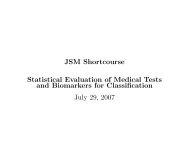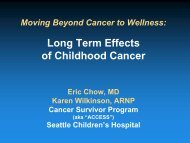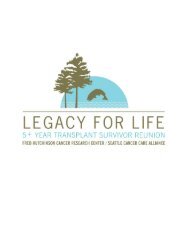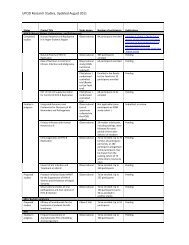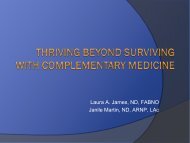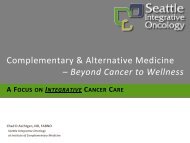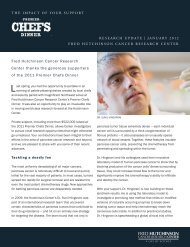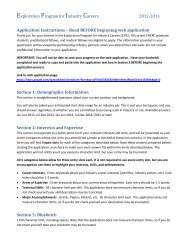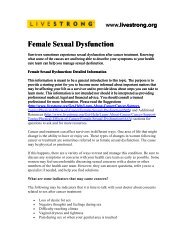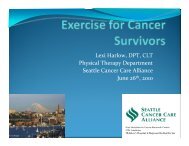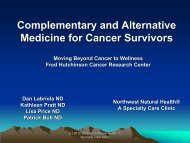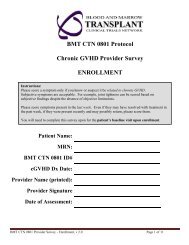Summer Undergraduate Research Program - Fred Hutchinson ...
Summer Undergraduate Research Program - Fred Hutchinson ...
Summer Undergraduate Research Program - Fred Hutchinson ...
Create successful ePaper yourself
Turn your PDF publications into a flip-book with our unique Google optimized e-Paper software.
Extra Personal Statement #11<br />
When I began work on my Masters of Public Health at the University of California, San Diego, I<br />
thought I knew what epidemiology was. I envisioned my future as an epidemiologist involving<br />
outbreak investigations and lab work. One year later, as I observed the meeting of a scientific<br />
advisory committee, convened to brainstorm ideas for studies to elucidate why breast cancer<br />
incidence rates were elevated in Marin County, California, my understanding of epidemiology<br />
was transformed, as was my vision of my future. In listening to the epidemiologists on the<br />
committee, including Dr. Janet Daling, discuss their own cancer studies and the epidemiologic<br />
process I began to understand how powerful epidemiology is – how a properly designed casecontrol<br />
study can yield results that point towards biological pathways and how the findings of a<br />
cohort study can guide medical practice. I was particularly inspired by Dr. Daling’s work<br />
describing the associations between hormone replacement therapy and breast cancer by<br />
histological type. I knew then that I wanted to be a cancer epidemiologist. I knew then that<br />
cancer epidemiology appealed not only to my analytical nature, but also to my desire to focus my<br />
professional efforts in a field that had societal relevance. I knew then that I wanted to design and<br />
carry out my own epidemiological studies and collaborate with others to enhance pre-existing<br />
studies. I knew then that I wanted to do cancer research in an academic setting that encouraged<br />
creative scientific thinking to solve public health questions.<br />
During my second year of MPH studies I put my new-found inspiration into practice. With my<br />
Master’s thesis I investigated the hypothesis that population misestimation artificially elevated<br />
breast cancer incidence rates in Marin County, California; I used Poisson regression to compare<br />
breast cancer incidence rates based on population counts from the 2000 Census to breast cancer<br />
incidence rates based on population projections for the year 2000 projected from the 1990<br />
Census. I found that population projections for Marin County had significantly underestimated<br />
the size of the population of women aged 45-64, and that this underestimation had been<br />
sufficient to significantly increase the estimated incidence rate of breast cancer in Marin County<br />
in the late 1990s. Following the completion of my MPH in epidemiology, I spent several months<br />
at the Marin County Department of Health reworking this research and preparing a manuscript<br />
for publication (Journal of XX, June XXXX). With this publication I asserted that the extensive<br />
efforts devoted to cancer surveillance research lose some of their utility when inaccurate<br />
population projections must be relied upon for timely reporting of incidence and mortality data.<br />
In the fall of XXXX, I accepted a position as an epidemiologist at the Northern California<br />
Cancer Center (NCCC) under Dr. XX. Since joining the NCCC I have had the privilege to work<br />
with data from the Bay Area Women’s Health Study and the Northern California Breast Cancer<br />
Collaborative Family Registry, both designed to examine breast cancer risk in understudied<br />
minority populations. My most significant project with the NCCC thus far has been a casecontrol<br />
analysis investigating the association between migration history and breast cancer risk in<br />
Hispanic women (Journal of XX, December XXXX); for this research project I performed all<br />
literature review, data cleaning, and data analysis, and contributed significantly to the<br />
preparation of the final manuscript. I currently have several additional projects in various stages<br />
of development, including a descriptive analysis of differences in rates of participation in a<br />
breast cancer family registry by race/ethnicity, and an analysis of the variation in prevalence and<br />
effect of reproductive risk factors for breast cancer in a multiethnic population. My role at the<br />
NCCC has also included managing the genomics database for the organization’s breast cancer<br />
family registry; this responsibility has not only allowed me to revisit and apply my<br />
142




